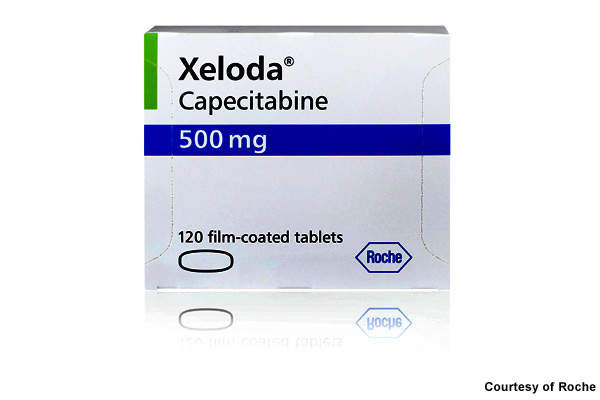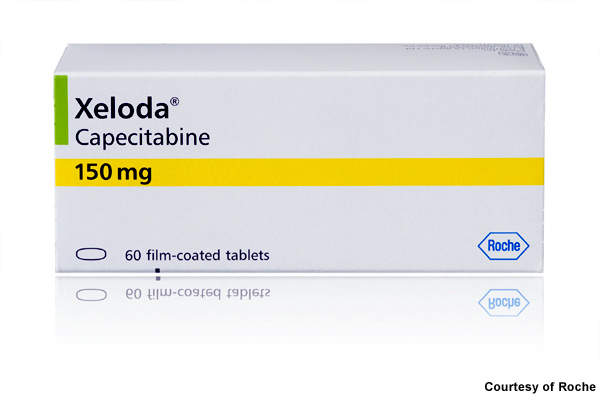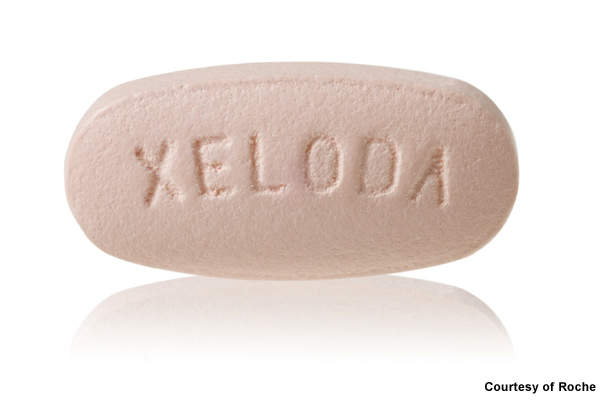Xeloda is an approved oral drug developed by F. Hoffmann-La Roche (Roche) for treating metastatic colorectal cancer and breast cancer. The drug was first approved in the US and EU in 2001 as monotherapy for treating colorectal cancer.
Since then, Xeloda has been approved for treating other forms of cancer such as gastric cancer and metastatic breast cancer. Xeloda was approved to treat these cancers as monotherapy and in combination with other drugs.
In March 2010, Xeloda – in combination with Oxaliplatin – was approved by the EU for the adjuvant treatment of patients suffering from early colon cancer.
Metastatic colorectal cancer
Colorectal cancer, also known as colon cancer, is characterised by malignant mutations in the colon, rectum and appendix. The disease manifests from mushroom-shaped growths called polyps on the lining of the colon or rectum. These growths are normally benign but few of them can transform into cancer later on.
People over the age of 60 are more susceptible to colorectal cancer. Hereditary reasons can also lead to colon cancer in close relatives. Smoking, drinking, a diet high in red meat, physical inactivity and inflammatory bowel disease are other causes of the disease.
Colorectal cancer is the fifth biggest cancer reported in the US and is the second biggest cause of death in Europe. Almost 73% of colorectal cancer cases can be treated by surgery or chemotherapy. If untreated, the disease can spread to other parts of the body, leading to metastatic colorectal cancer. This type of cancer is sometimes difficult to treat as it spreads to distant locations of the body.
Roche’s Xeloda
Colorectal cancer, or any type of cancer in the body, is caused by the uncontrolled division of cells. Chemotherapy normally aims at containing this uncontrolled division by destroying the cancer cells. The therapy, however, cannot differentiate between healthy cells and cancerous cells, which leads to the destruction of healthy cells.
Roche’s Xeloda belongs to a class of chemotherapy called as antimetabolites. Antimetabolites are substances found within the cells and are cell-cycle specific. They generally attack cells at particular phases in the cycle. When a cell absorbs antimetabolites such as Xeloda, it becomes unable to divide. Compared with traditional chemotherapy, Xeloda targets the cancer cells specifically.
Xeloda works by activating the cancer-fighting agent fluorouracil (5-FU) inside the cancer cells. A naturally produced enzyme, thymidine phosphorylase (TP), is responsible for activating 5-FU. As it is an oral formulation, the use of Xeloda reduces a patient’s hospital visits compared with traditional chemotherapy.
Xeloda clinical trials
The FDA approval of Xeloda was based on two phase III studies conducted across various centres around the world. The studies involved 1,200 patients suffering from metastatic colorectal cancer. In the studies, Xeloda was able to shrink cancer tumours effectively compared with other treatments.
The recent approval of Xeloda in combination with Oxaliplatin was based on a study named as NO16968. The randomised Phase III study included 1,886 patients and was carried out at 226 centres across 29 countries. The trial showed that the combination of Xeloda and Oxaliplatin produced substantially superior disease-free survival in patients suffering from early colon cancer.
Marketing commentary
Xeloda is marketed and sold in over 100 countries. Over the years, Xeloda has helped to treat more than 1.8 million people suffering from cancer. It is one of the top-selling drugs in Roche’s portfolio, with sales reaching more than $1.12bn in 2008. Market growth of the drug has been the highest in Japan with a 74% increase in sales in 2008.
With 130,000 new cases of colorectal cancer reported each year, strong treatments for curing the disease are required.
The market position of Xeloda has been improving steadily with newer approvals. The recent approval for adjuvant treatment in combination with Oxaliplatin is expected to further boost the drug’s market position.






